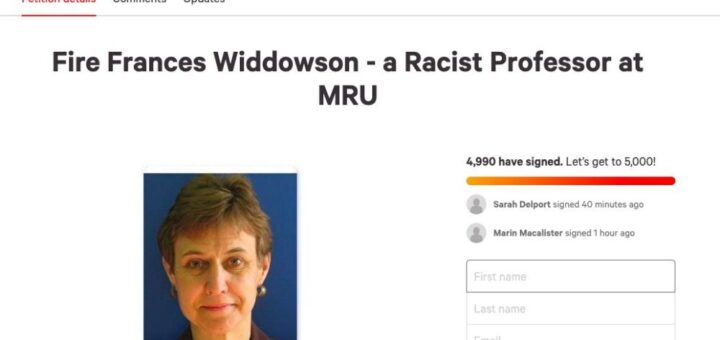“Challenging, but not impossible”: A brief history of Frances Widdowson’s dissent

By Noel Harper, News Editor
This past summer was marked, if not by the COVID-19 pandemic, by a worldwide conversation and movement to end racism and reconcile with marginalized communities. The movement continues on and has influenced many powerful institutions — politics, sports, health and as university classes return, academia.
Mount Royal University (MRU) spent the week of Sept. 7 committing to fight against racism both on campus and in the community, while attempting to reassure its staff and students that the views of one of its own would not unravel this commitment.
At the start of that week, a profile of MRU policy studies professor, Frances Widdowson, appeared in the Western Standard, an Alberta-based news website.
Widdowson was not picked at random to be profiled by the site –– her activities on Twitter in the wake of the anti-racism movement garnered significant publicity, particularly by those who have spoken out against her views.
In June, Widdowson used the platform to defend CBC journalist Wendy Mesley, who was disciplined after quoting from the title of a book that contained a racial slur during a private meeting.
“Shame on CBC for making Mesley grovel,” she wrote as part of a series of tweets that was shared by several MRU faculty members, on-brand for her platform advocating for freedom of speech and thought.
The tenured professor’s goal, according to the Standard, is to fight against the university’s so-called “woke faculty,” as well as the Black Lives Matter movement, claiming that both have negatively impacted the university.
At present, Widdowson’s personal Twitter account — @FrancesWiddows1 — resembles a parody of itself, being used to showcase those who oppose her while mockingly taking on the perspective of this opposition. It is, in part, an intentional homage to Titania McGrath, a satirical character created by British comedian Andrew Doyle.
After the Standard profile was published, a petition was struck urging MRU to fire Widdowson for her comments. As of Sept. 15, the petition had more than 5,000 signatures.
“In ignoring the racist actions of people in power, we directly contribute to the systemic racism within our society,” petition author Kenna Fraser writes.
It wasn’t long before the university was forced to respond to the issue, and did so in a statement released two days after the petition first circulated.
“When views are expressed by a member of the MRU community, it does not mean the institution shares these views. Within the bounds of Canadian law, people have the basic right to freely express their ideas,” the statement from MRU President Tim Rahilly read in part.
To the university, maintaining the balance between that right and the safety of the community is “challenging, but not impossible.”
While dealing with the fallout from the Widdowson story, MRU took part in Scholar Strike Canada, in which several Canadian universities were called to condemn racism against BIPOC (Black, Indigenous, people of colour) individuals.
Between Sept. 9 and Sept. 10, some professors pressed pause on their lectures and invited students to show solidarity in calling for an end to racial violence.
“History has proven academia has a key role in advocating for a just society. Supporting this strike is just one thing we can do to help bring about necessary and overdue change,” read a statement from interim provost Elizabeth Evans.
Widdowson referenced the strike and her disagreement with it, telling the Standard, “You’re supposed to be teaching. That’s your job.”
To end the week, MRU’s academic governance body, the General Faculties Council, passed a motion titled, “Acknowledgement of the Harm done to Indigenous Peoples by Colonization and by the Trauma Inflicted by the Residential School System.”
The motion affirms residential schools as an act of genocide and the university’s support for reconciliation with Indigenous peoples.
“Has Mount Royal University completely lost its mind … what does this mean for the university as an intellectual space where different ideas can be expressed?” Widdowson responded on Facebook.
“This motion was a statement of our collective values; she’s allowed to dissent, but one dissenting voice does not change those values,” wrote MRU Sociology professor Tim Haney.
Residential schools — used by the Canadian government to assimilate Indigenous children into western society, resulting in more than 3,200 deaths — is Widdowson’s current area of study.
“What people don’t realize is that these Indigenous children were able to get an education that normally they wouldn’t have received,” Widdowson told the Standard. One tweet from Widdowson describes the residential school system as “assimilat[ing] with literacy.”
MRU’s statement on the matter says it is “reviewing the concerns” brought forth by the community. Widdowson is currently on sabbatical.


